本章主要简述epoll的基础理论知识。方便理解libevent。
2.1 流?I/O操作/阻塞
2.1.1 流
- 可以进行I/O操作的内核对象
- 文件、管道、套接字……
- 流的入口:文件描述符(fd)
2.1.2 I/O操作


所有对流的读写操作,我们都可以称之为IO操作。
那么当一个流中再没有数据,read的时候,或者说在流中已经写满了数据,再write,我们的IO操作就会出现一种现象,就是阻塞现象。
2.1.2 阻塞
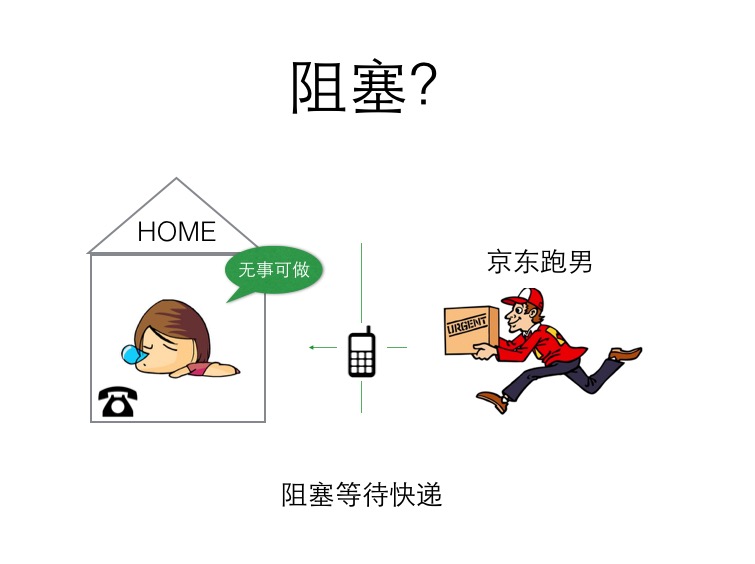

- 阻塞等待
空出大脑可以安心睡觉。(不占用CPU宝贵的时间片)
- 非阻塞,忙轮询
浪费时间,浪费电话费,占用快递员时间(占用CPU,系统资源)
2.2 解决阻塞死等待的办法
2.2.1 阻塞死等待的缺点
2.2.2 办法一:非阻塞、忙轮询
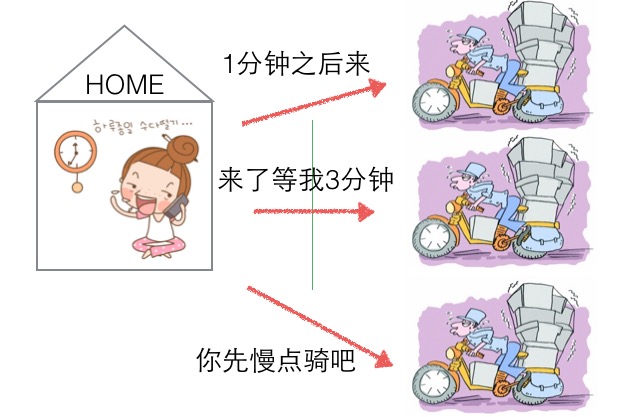
while true {for i in 流[] {if i has 数据 {读 或者 其他处理}}}
2.2.3 办法二:select
2.2.3 办法三:epoll
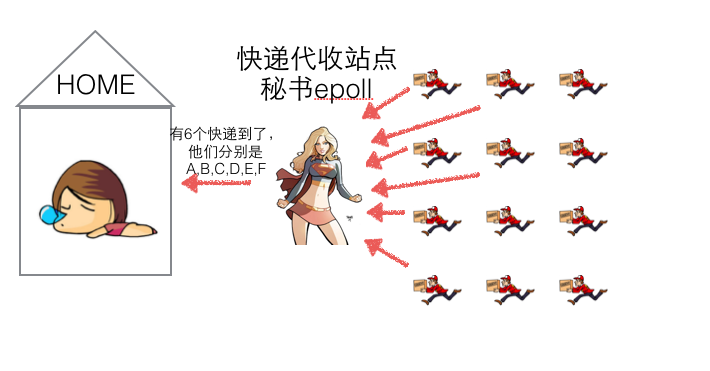
while true {可处理的流[] = epoll_wait(epoll_fd); //阻塞for i in 可处理的流[] {读 或者 其他处理}}
2.3 什么是epoll
- 与select,poll一样,对I/O多路复用的技术
- 只关心“活跃”的链接,无需遍历全部描述符集合
- 能够处理大量的链接请求(系统可以打开的文件数目)
2.4 epoll API
2.4.1 创建EPOLL
/*** @param size 告诉内核监听的数目** @returns 返回一个epoll句柄(即一个文件描述符)*/int epoll_create(int size);
int epfd = epoll_create(1000);
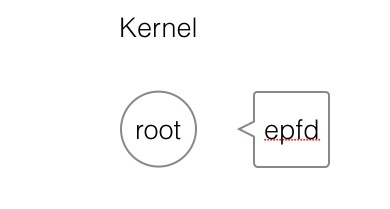
2.4.2 控制EPOLL
/*** @param epfd 用epoll_create所创建的epoll句柄* @param op 表示对epoll监控描述符控制的动作** EPOLL_CTL_ADD(注册新的fd到epfd)* EPOLL_CTL_MOD(修改已经注册的fd的监听事件)* EPOLL_CTL_DEL(epfd删除一个fd)** @param fd 需要监听的文件描述符* @param event 告诉内核需要监听的事件** @returns 成功返回0,失败返回-1, errno查看错误信息*/int epoll_ctl(int epfd, int op, int fd,struct epoll_event *event);struct epoll_event {__uint32_t events; /* epoll 事件 */epoll_data_t data; /* 用户传递的数据 */}/** events : {EPOLLIN, EPOLLOUT, EPOLLPRI,EPOLLHUP, EPOLLET, EPOLLONESHOT}*/typedef union epoll_data {void *ptr;int fd;uint32_t u32;uint64_t u64;} epoll_data_t;
struct epoll_event new_event;new_event.events = EPOLLIN | EPOLLOUT;new_event.data.fd = 5;epoll_ctl(epfd, EPOLL_CTL_ADD, 5, &new_event);
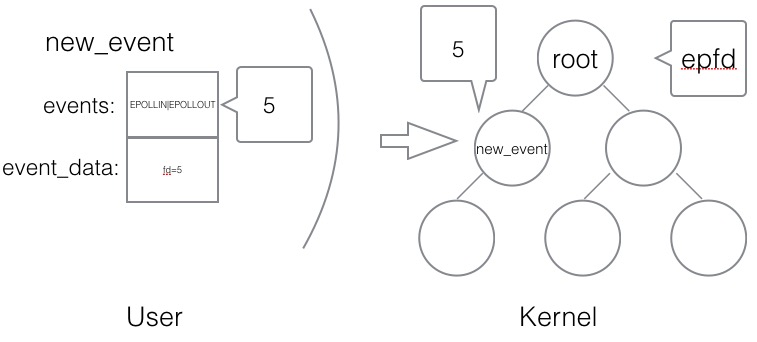
2.4.3 等待EPOLL
/**** @param epfd 用epoll_create所创建的epoll句柄* @param event 从内核得到的事件集合* @param maxevents 告知内核这个events有多大,* 注意: 值 不能大于创建epoll_create()时的size.* @param timeout 超时时间* -1: 永久阻塞* 0: 立即返回,非阻塞* >0: 指定微秒** @returns 成功: 有多少文件描述符就绪,时间到时返回0* 失败: -1, errno 查看错误*/int epoll_wait(int epfd, struct epoll_event *event,int maxevents, int timeout);
struct epoll_event my_event[1000];int event_cnt = epoll_wait(epfd, my_event, 1000, -1);
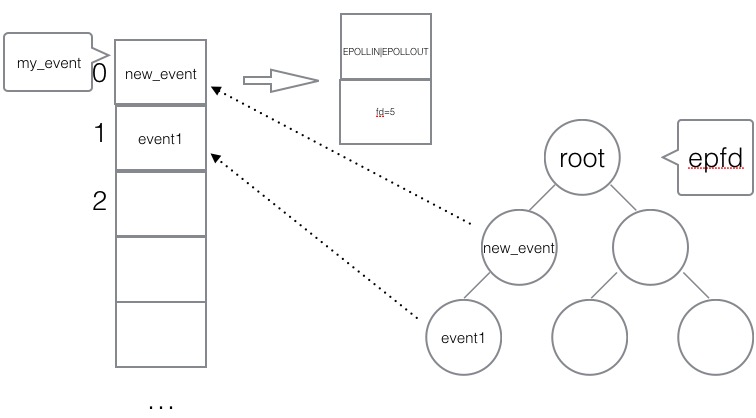
2.4.4 epoll编程框架
//创建 epollint epfd = epoll_crete(1000);//将 listen_fd 添加进 epoll 中epoll_ctl(epfd, EPOLL_CTL_ADD, listen_fd,&listen_event);while (1) {//阻塞等待 epoll 中 的fd 触发int active_cnt = epoll_wait(epfd, events, 1000, -1);for (i = 0 ; i < active_cnt; i++) {if (evnets[i].data.fd == listen_fd) {//accept. 并且将新accept 的fd 加进epoll中.}else if (events[i].events & EPOLLIN) {//对此fd 进行读操作}else if (events[i].events & EPOLLOUT) {//对此fd 进行写操作}}}
2.5 触发模式
2.5.1 水平触发
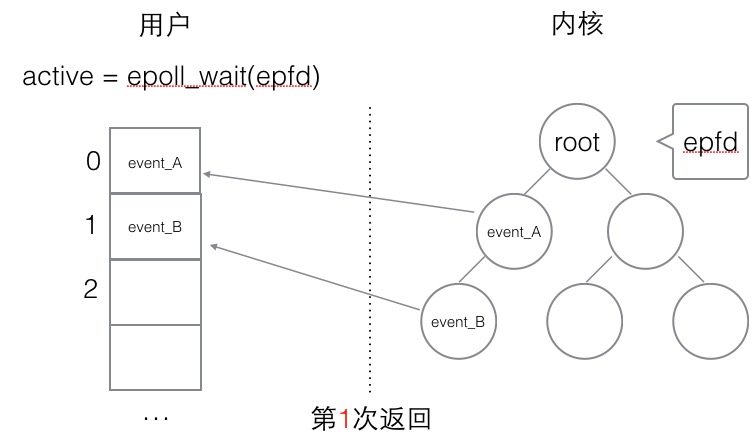
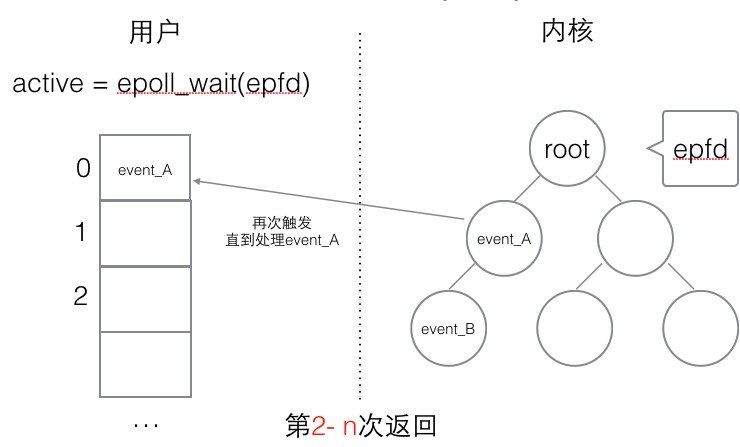
水平触发的主要特点是,如果用户在监听epoll事件,当内核有事件的时候,会拷贝给用户态事件,但是如果用户只处理了一次,那么剩下没有处理的会在下一次epoll_wait再次返回该事件。
这样如果用户永远不处理这个事件,就导致每次都会有该事件从内核到用户的拷贝,耗费性能,但是水平触发相对安全,最起码事件不会丢掉,除非用户处理完毕。
2.5.2 边缘触发
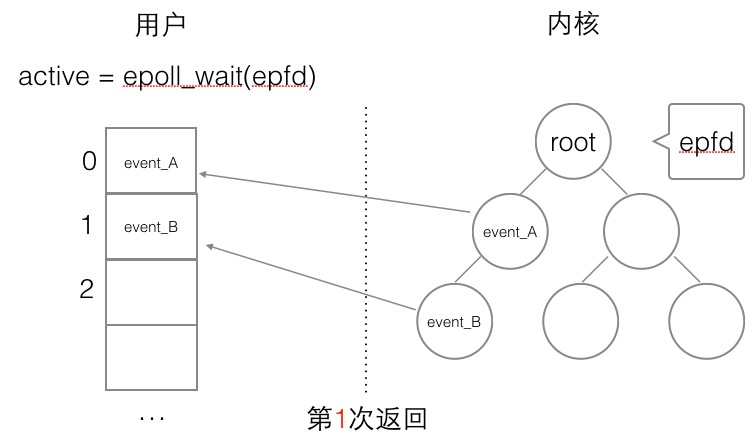
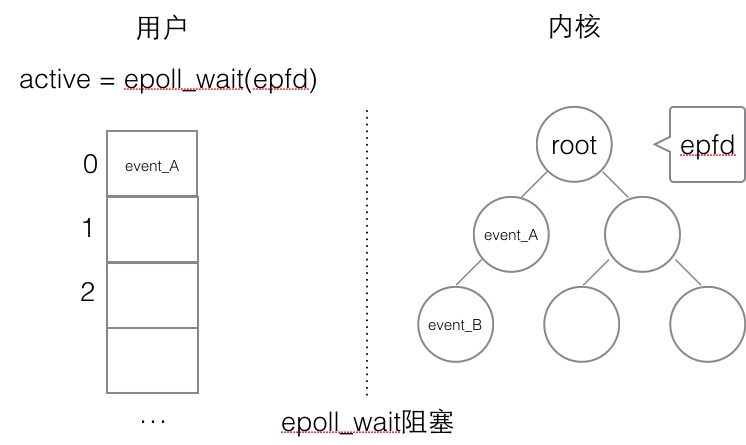
边缘触发,相对跟水平触发相反,当内核有事件到达, 只会通知用户一次,至于用户处理还是不处理,以后将不会再通知。这样减少了拷贝过程,增加了性能,但是相对来说,如果用户马虎忘记处理,将会产生事件丢的情况。
2.6 epoll服务器
2.6.1 服务端
#include <stdio.h>#include <stdlib.h>#include <ctype.h>#include <string.h>#include <unistd.h>#include <sys/types.h>#include <sys/socket.h>#include <arpa/inet.h>#include <sys/epoll.h>#define SERVER_PORT (7778)#define EPOLL_MAX_NUM (2048)#define BUFFER_MAX_LEN (4096)char buffer[BUFFER_MAX_LEN];void str_toupper(char *str){int i;for (i = 0; i < strlen(str); i ++) {str[i] = toupper(str[i]);}}int main(int argc, char **argv){int listen_fd = 0;int client_fd = 0;struct sockaddr_in server_addr;struct sockaddr_in client_addr;socklen_t client_len;int epfd = 0;struct epoll_event event, *my_events;// socketlisten_fd = socket(AF_INET, SOCK_STREAM, 0);// bindserver_addr.sin_family = AF_INET;server_addr.sin_addr.s_addr = htonl(INADDR_ANY);server_addr.sin_port = htons(SERVER_PORT);bind(listen_fd, (struct sockaddr*)&server_addr, sizeof(server_addr));// listenlisten(listen_fd, 10);// epoll createepfd = epoll_create(EPOLL_MAX_NUM);if (epfd < 0) {perror("epoll create");goto END;}// listen_fd -> epollevent.events = EPOLLIN;event.data.fd = listen_fd;if (epoll_ctl(epfd, EPOLL_CTL_ADD, listen_fd, &event) < 0) {perror("epoll ctl add listen_fd ");goto END;}my_events = malloc(sizeof(struct epoll_event) * EPOLL_MAX_NUM);while (1) {// epoll waitint active_fds_cnt = epoll_wait(epfd, my_events, EPOLL_MAX_NUM, -1);int i = 0;for (i = 0; i < active_fds_cnt; i++) {// if fd == listen_fdif (my_events[i].data.fd == listen_fd) {//acceptclient_fd = accept(listen_fd, (struct sockaddr*)&client_addr, &client_len);if (client_fd < 0) {perror("accept");continue;}char ip[20];printf("new connection[%s:%d]\n", inet_ntop(AF_INET, &client_addr.sin_addr, ip, sizeof(ip)), ntohs(client_addr.sin_port));event.events = EPOLLIN | EPOLLET;event.data.fd = client_fd;epoll_ctl(epfd, EPOLL_CTL_ADD, client_fd, &event);}else if (my_events[i].events & EPOLLIN) {printf("EPOLLIN\n");client_fd = my_events[i].data.fd;// do readbuffer[0] = '\0';int n = read(client_fd, buffer, 5);if (n < 0) {perror("read");continue;}else if (n == 0) {epoll_ctl(epfd, EPOLL_CTL_DEL, client_fd, &event);close(client_fd);}else {printf("[read]: %s\n", buffer);buffer[n] = '\0';#if 1str_toupper(buffer);write(client_fd, buffer, strlen(buffer));printf("[write]: %s\n", buffer);memset(buffer, 0, BUFFER_MAX_LEN);#endif/*event.events = EPOLLOUT;event.data.fd = client_fd;epoll_ctl(epfd, EPOLL_CTL_MOD, client_fd, &event);*/}}else if (my_events[i].events & EPOLLOUT) {printf("EPOLLOUT\n");/*client_fd = my_events[i].data.fd;str_toupper(buffer);write(client_fd, buffer, strlen(buffer));printf("[write]: %s\n", buffer);memset(buffer, 0, BUFFER_MAX_LEN);event.events = EPOLLIN;event.data.fd = client_fd;epoll_ctl(epfd, EPOLL_CTL_MOD, client_fd, &event);*/}}}END:close(epfd);close(listen_fd);return 0;}
2.6.2 客户端
#include <stdio.h>#include <stdlib.h>#include <string.h>#include <strings.h>#include <sys/types.h>#include <sys/socket.h>#include <arpa/inet.h>#include <unistd.h>#include <fcntl.h>#define MAX_LINE (1024)#define SERVER_PORT (7778)void setnoblocking(int fd){int opts = 0;opts = fcntl(fd, F_GETFL);opts = opts | O_NONBLOCK;fcntl(fd, F_SETFL);}int main(int argc, char **argv){int sockfd;char recvline[MAX_LINE + 1] = {0};struct sockaddr_in server_addr;if (argc != 2) {fprintf(stderr, "usage ./client <SERVER_IP>\n");exit(0);}// 创建socketif ( (sockfd = socket(AF_INET, SOCK_STREAM, 0)) < 0) {fprintf(stderr, "socket error");exit(0);}// server addr 赋值bzero(&server_addr, sizeof(server_addr));server_addr.sin_family = AF_INET;server_addr.sin_port = htons(SERVER_PORT);if (inet_pton(AF_INET, argv[1], &server_addr.sin_addr) <= 0) {fprintf(stderr, "inet_pton error for %s", argv[1]);exit(0);}// 链接服务端if (connect(sockfd, (struct sockaddr*) &server_addr, sizeof(server_addr)) < 0) {perror("connect");fprintf(stderr, "connect error\n");exit(0);}setnoblocking(sockfd);char input[100];int n = 0;int count = 0;// 不断的从标准输入字符串while (fgets(input, 100, stdin) != NULL){printf("[send] %s\n", input);n = 0;// 把输入的字符串发送 到 服务器中去n = send(sockfd, input, strlen(input), 0);if (n < 0) {perror("send");}n = 0;count = 0;// 读取 服务器返回的数据while (1){n = read(sockfd, recvline + count, MAX_LINE);if (n == MAX_LINE){count += n;continue;}else if (n < 0){perror("recv");break;}else {count += n;recvline[count] = '\0';printf("[recv] %s\n", recvline);break;}}}return 0;}


